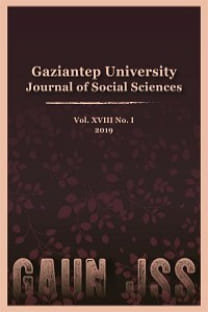Attitudes of Students Studying In Health Related Departments towards the Elderly
Sağlıkla İlgili Bölümlerde Okuyan Öğrencilerin Yaşlılara Yönelik Tutumları
___
- Ayoğlu, F. N., Kulakçı, H., Ayyıldız, T. K., Aslan, G. K., & Veren, F. (2013). Attitudes of Turkish Nursing and Medical Students Toward Elderly People. Journal of Transcultural Nursing, 25(3), 241-248.
- Barnoy, S., Volfin-Pruss, D., Ehrenfeld, M., Kushnir, T. (2008). Factors affecting nurses' attitudes in Israel toward patients who present them with Internet medical Information. Nursing Outlook, 56(6), 314-321.
- Bleijenberg, N., Jansen, M. J. M., Schuurmans, M. J. (2012). Dutch nursing students' knowledge and attitudes towards older people-A longitudinal cohort study. Journal of Nursing Education and Practice, 2(2), 1-8.
- Chung, J. Y. M., Chan, J. T. S., Yeung, R. S. D., Wan, R. C. H., Ho, S. T. (2003). Nurses' attitude toward alcoholic patients in accident and emergency department in Hong Kong. Hong Kong College of Emergency Medicine, 10(2), 104-112.
- Coopersmith, S. (1986). Self-esteem Inventories. Consulting Psychologists Press, California.
- Dimitriadou- Panteka, A., Koukourikos, K., Pizirtzidou, E. (2014). The Concept of Self-Esteem in Nursing Education and its Impact on Professional Behavior. International Journal of Caring Sciences, 7(1), 6-11.
- Doherty, M., Mitchell, E. A., & O'Neill, S. (2011). Attitudes of healthcare workers towards older people in a rural population: A survey using the Kogan Scale. Retrieved from http://www.hindawi.com/journals/nrp/2011/352627/
- Erdemir, F., Kav, S., Citak, E.A., Hanoglu, Z., Karahan, A. (2011). A Turkish version of Kogan's attitude toward older people (KAOP) scale: reliability and validity assessment. Archives of Gerontology and Geriatrics, 30, 1- 4.
- Findler, L., Vilchinsky, N., Werner, S. (2007). The Multidimensional Attitudes Scale toward persons with disabilities (MAS): Construction and validation. Rehabilitation Counseling Bulletin, 50, 166-176.
- Gallagher, S., Bennett, K. M., Halford, J. C. (2006). A comparison of acute and long-term health-care personnel's attitudes towards older adults. International Journal of Nursing Practice, 12 (5), 273-279.
- Goodson, P., Buhi, E. R, Dunsmore, S. C. (2006). Self-esteem and adolescent sexual behaviors, attitudes, and intentions: a systematic review. Journal of Adolescent Health, 38, 310-319.
- Hamoud, S. A., El Dayem, S. A., Ossman, L. H. (2011). The Effect of an Assertiveness Training Program on Assertiveness Skills and Self-Esteem of Faculty Nursing Students. Journal of American Science, 7 (12), 1085- 1096.
- Hweidi, I. M., Al-Obeisat, S. M. (2006). Jordanian nursing students' attitudes toward the elderly. Nurse Education Today, 26(1), 23-30.
- İnceoğlu, M. (2010). Tutum Algı http://www.beykent.edu.tr/WebProjects/Uploads/METIN%20INCEOGLU _Tutum-algi-iletisim.pdf.
- ISSN: 1303-0094
- Yayın Aralığı: 4
- Başlangıç: 1991
- Yayıncı: Gaziantep Üniv. Sosyal Bilimler Enst.
Kamu Kurum ve Kuruluşlarına Duyulan Güveni Etkileyen Faktörler Üzerine Nicel Bir İnceleme
Bahadır ŞAHİN, Hakan Batırhan KARA
Deliler Saltanatı Örneğinde Cumhuriyet Devri Popüler Tarih Romanlarında Osmanlı Algısı
Attitudes of Students Studying In Health Related Departments towards the Elderly
Işıl KALAYCI, Sercan Özbek YAZICI, Ayşe TEKİN, Esin KAYA
Turizm Rehberliği Öğrencilerinin Mesleğe Yönelik Tutumları
İnci Gibi Dişler’de Irk Sorunu
Tevkifata Tabi Bir Teslimin Yeniden Tesliminde Tevkifat - Kdv İadesi ve Muhasebe Uygulaması
Türkiye’deki Suriyeli Mülteciler ve Gaziantep İlindeki Yansımaları
Ersin Kaya SANDAL, Mesut HANÇERKIRAN, Mehmet TIRAŞ
Yabancı Dil Olarak Türkçe Öğrenen Öğrencilerin Yazılı Anlatımlarına Yönelik Yanlış Çözümlemesi
